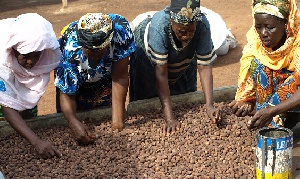Regional News of Thursday, 16 October 2014
Source: GNA
Network condemns destruction of shea trees
Shea Network Ghana (SNG), a civil society organization, has condemned the destruction of shea trees for charcoal, plantation crops, construction and development as farm lands.
This was contained in a press statement issued by SNG signed by its Coordinator, Mr Zakaria Iddi and copied to the Ghana News Agency in Tamale on Wednesday to commemorate the United Nations International Day of Rural Women.
The day is set aside to recognize the critical roles and contributions of rural and indigenous women in enhancing agricultural and rural development, improving food security and eradicating rural poverty.
This year’s commemoration was on the theme: “Equality for women is progress for all.”
The statement said “The open destruction of non- timber forest species, including the shea trees, otherwise known as economic tree of the north ,if not curtailed, would affect the future income security of rural women in the north.”
It said the destruction of the shea trees was a major challenge affecting the shea industry in the country.
The statement “Recommends the establishment of a specific regulation for the management and protection of shea trees and other non-timber forests in the north.”
It said “While working to ensure this national level regulation, efforts should be made to assist district assemblies to develop and gazette their respective by-laws as well as carry out community level sensitization to ensure that the protection of the shea tree is a collective responsibility of all community members.”
It called on the Savannah Accelerated Development Authority and the Ministry of Local Government and Rural Development to ensure that better programmes were executed to benefit rural women and the environment.
It recognised the role of rural women in nation building saying “Rural women are key role players in crop production and livestock care, provision of household food, water and fuel for their families, and engage in off-farm activities to diversify their families’ livelihoods.”











